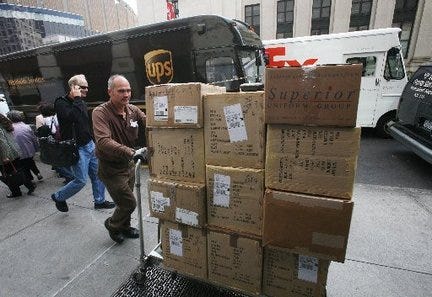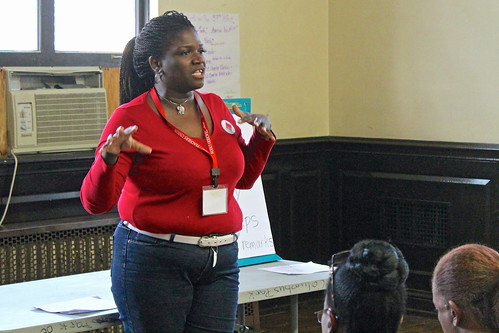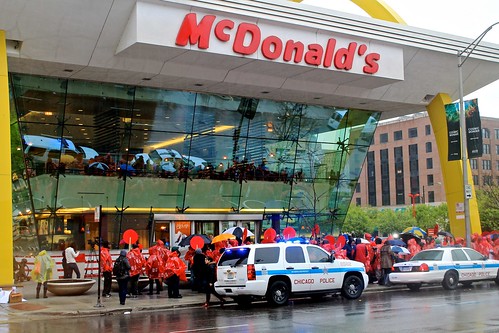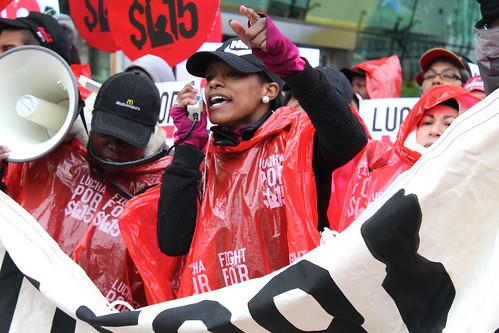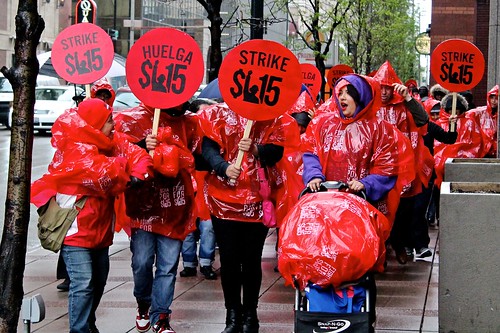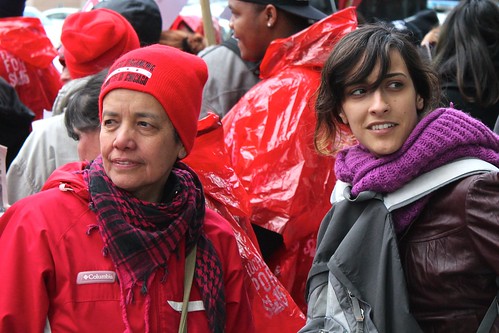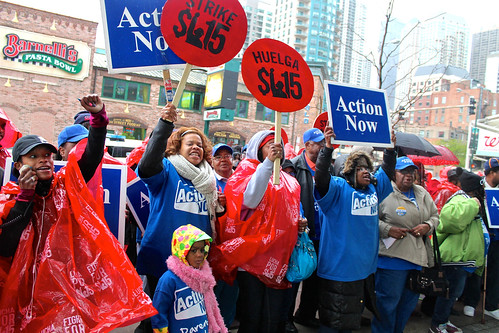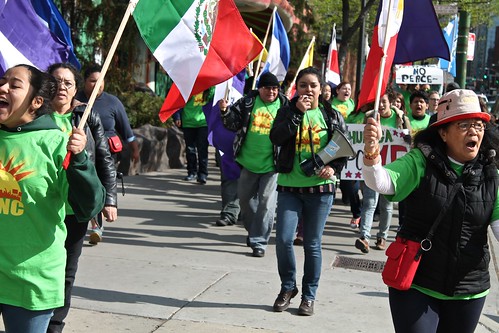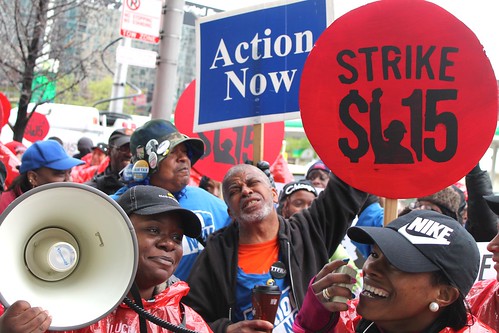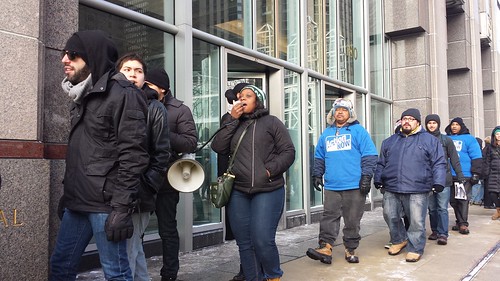
My review of The Package King: A Rank and File History of the United Parcel Service by Joe Allen–
Filed under: Global issues, Society and Economy, Unions, US politics

“Working at UPS should be the best job in America and it just isn’t.” — — a Teamster negotiator to a UPS official during the tense 1997 national contract negotiations.
I was once a package driver for a brief time back in the 1970’s at a non-union local Silver Spring MD delivery company. I did enjoy being out on the road, meeting people on the loading docks, listening to the occasionally humorous chatter on the dispatch radio and knowing the best places around DC to cop a submarine sandwich for lunch.
But one day after almost 12 hours on the road, I fell asleep in the slow lane of a Northern Virginia highway and woke up in the fast lane. I was lucky. I could have killed several people including myself. I quit that company soon afterward and found warehouse and trucking work at a place with regular hours and a union.
Yes, working for United Parcel Service, the leading US package delivery company should be a good job, as the anonymous Teamster negotiator indicated. Joe Allen’s new book, The Package King: A Rank and File History of the United Parcel Service , explains why it isn’t.
Today’s UPS package drivers are subjected to intense surveillance, constant speedup, are subject to serious injury and face a harsh disciplinary system where guilt is assumed. In the warehouses, workers are subjected to brutal unsafe working conditions and many are part-timers laboring at poverty wages.
Fight for $15: Breaking the silence about suburban poverty
Filed under: Race and gender, Society and Economy, Unions
“As a 44-year-old man, making $8.25, living paycheck to paycheck and barely being able to survive just isn’t right. I love to cook. I love what I do for a living. That’s why we’re calling for fair wages for fast food workers in Chicago’s suburbs. From Oak Park to Cicero, to Sauk Village to Barrington Hills, we need this. That’s why we’re standing together in the suburbs and calling for $15. Suburban workers are struggling and we need higher wages so that we too can be part of the American dream.”—-Anthony Kemp, Oak Park IL KFC worker
Silence can be a powerful way to communicate a message. That was certainly true at the September 28 meeting of the Oak Park Illinois Village Board.After hearing 5 speakers representing the Fight for $15 movement speak about the importance of passing a Living Wage Ordinance in the town and the need for a $15 a hour minimum wage throughout Chicagoland, their heartfelt words were met with a perfunctory almost expressionless,”We really thank you for your thoughts,” from the Mayor and silence from the rest of the Village Board.
The Oak Park Village Board would not even summon up a few pious platitudes of encouragement to the workers and community allies who filled the meeting while their representatives took to the podium.

The Chicago election: the electoral revolution that didn’t happen
Filed under: Race and gender, Society and Economy, Unions, US politics
It was one helluva an election season on the shores of Lake Michigan. Last summer I was brimming with optimism. The Chicago Teachers Union(CTU) had people out canvassing the neighborhoods. CTU President Karen Lewis was polling well in a possible mayoral bid and it looked like Mayor Rahm Emanuel was on the run.
I foresaw an electoral revolution in the works. As a veteran of the Harold Washington days, I imagined the charismatic Karen Lewis recruiting a working class army of supporters, including the the working poor and the unemployed. Energetic reform candidates for City Council would emerge. Many of the largely Black and Brown non-voters would finally have something worth voting for—for a change.
A multi-racial rainbow coalition would sweep into power on election day and the day after election day, face the combined wrath of the LaSalle Street bankers and hedge fund bunco artists. But we would not only have people in office, we’d have a powerful movement for social and economic justice to back them up.
It didn’t happen. Karen announced that she was seriously ill with a brain tumor and could not run. She is now undergoing treatment. (BTW Chicagoans love to call their politicians by their first names).
Fight for $15 joins striking BP oil workers on the picketline
Filed under: Society and Economy, Unions
(Note: As of this writing there are reports that Shell, the industry leader, has reached a settlement with the United Steel Workers union which is on strike. Picketlines at BP are still up as of Friday afternoon March 13).
“It appeared as if the whole world was one elaborate system, opposed to justice and kindness, and set to making cruelty and pain.” ― Upton Sinclair from his novel OIL!
When 20th century writer Upton Sinclair’s novel Oil!, (about the birth of the petroleum industry) was turned into a film, it was titled “There Will Be Blood”. The film makers weren’t kidding. Humans go to war for oil. Workers die drilling and refining it. People die from pollution when oil is processed or burned. Oil may eventually contribute to the extinction of humanity though runaway climate change.
The small city of Whiting, Indiana is the site of the largest oil refinery in the Midwest. Workers at this sprawling BP facility have been on strike since February 8, 2015, part of a nation-wide strike by the United Steel Workers (USW).
The strike issues revolve mostly around health and safety; not only for the workers inside the plant, but for the Whiting residents whose modest homes extend nearly to the plant gates. Residents are concerned about toxic substances released into the air and water as well as the possibility of catastrophic explosions.
Last week, members of the Workers Organizing Committee of Chicago (WOCC), rented a bus and rode down to Whiting and joined the striking oil workers picketline for a few hours. WOCC is best known for its Fight for $15 campaign to organize fast food workers for $15 an hour and a union.
WOCC member Teresa Cervantes explained why in this translation from her native Spanish,” I am here to support my fellow workers from Fight for $15 and the BP workers who are on strike today fighting for justice and fair wages.”
Her solidarity sentiments were echoed by her friend Rufina Aranda, a McDonalds worker in Cicero IL and a Fight for $15 veteran.

When the Nuns on the Bus rolled into Chicago
Filed under: Society and Economy, Unions, US politics
“We are working on voter registration which is an action people can take easily. It’s so important because there is so much big money in our country trying to steer legislation away from the common good.”– Dr. Patricia M. Fishman, Sisters of Mercy Associate
Nuns on the Bus? It sounds like a joke. But while the Catholic sisters of Nuns on the Bus do joke and laugh often, their mission is a serious one of social justice and compassion for the oppressed.
It was no joke to Sister Marie McKenna who is a social activist in Chicago:
“I work with a lot of people who can’t afford to pay their rent. They’re working full time but there is no living wage for them. Lots of folks are pulled into part-time employment situations with no benefits. If there is an illness or anything that disrupts even a short period of time, people are going under.”
Started in 2012 as a reaction to the Paul Ryan budget which punished people simply for the “sin” of being poor, Nuns on the Bus is a traveling group of nuns who ride across the country to promote their social justice agenda. In 2013, the theme of Nuns of the Bus was immigration. In 2014 it was voter registration.
Chicago was one of the bus stops for a day of action last week on Thursday September 25, 2014.
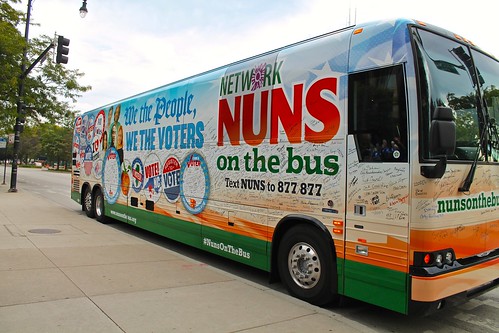
Working with Arise Chicago, a local workers center, there were plans for a morning of voter registration among students at the University of Illinois at Chicago (UIC), a meeting with Governor Pat Quinn where 3 low wage workers could tell their stories and a picnic in Union Park followed by a press conference and rally. Read more
Fred Wright: Labor Laffs for the Working Class
Filed under: Media, Unions, US politics
“There is a thin line that separates laughter and pain, comedy and tragedy, humor and hurt.” ― Erma Bombeck
Labor cartoonist Fred Wright was a radical artist who walked that thin line in a way that would impress any circus tightrope walker. The son of working class parents, Fred Wright knew the world of class warfare up-close and personal when he first began cartooning for the National Maritime Union (NMU) in 1939. He became staff cartoonist for the United Electrical, Radio and Machine Workers of America (UE) in 1949, a job he held until the early 1980’s.
Layoffs, industrial accidents, harassment of all types, discrimination, poverty wages, union-busting, exposure to mean bosses and other human tragedies were the basis for his humor.
Poet and playwright Bertolt Brecht once said,”The man who laughs has not yet heard the terrible news.” Fred Wright was used to hearing terrible news. It was all around him. And like Brecht, Wright understood how tragedy can be the basis of humor; humor that can help people laugh in the face of adversity and then if possible, organize and try to prevent the same tragedies from happening again.
Chicagoans prepare to take back their city: A view from the West Side
Filed under: Education, Unions, US politics
“Imagine what a community would look like that you and your children deserve and what are you willing to do to bring that to fruition.”—–Tara Stamps
Chicago Teachers Union(CTU) activist and West Side resident Tara Stamps repeated variations of that phrase in a packed community July 17th meeting held at LaFollette Park in the 37th Ward within the Austin neighborhood on Chicago’s far West Side. Each time she said it, she spoke slowly and distinctly to catch people’s attention.
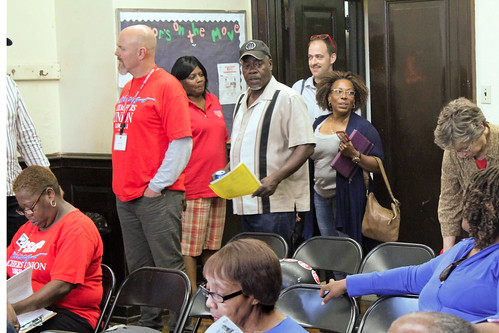
West Siders and allies gather in the LaFollette Park fieldhouse on Chicago’s West Side
With the expected announcement that CTU President Karen Lewis will run for Mayor against Rahm Emanuel, along with plans by the CTU and groups like the newly formed United Working Families to conduct massive voter registration and coordinate efforts by progressive aldermanic campaigns, meetings like this one at LaFollette Park take on a more urgent significance. It is a good example of the working class community organizing that is going on Chicago right now.There have been a number of similar meetings across the city in recent weeks.
Austin is Chicago’s largest neighborhood by physical area. Like much of the largely African American West Side, Austin has been hit hard by divestment, unemployment, low wage employment, foreclosures, street violence, and school closings, as well as school privatization through ”turnarounds” and charters.
The year 2014 marks the tenth anniversary of the decision by the Board of Education under Arne Duncan to close Austin High School as a general high school for the community, instead putting three small schools (two of them charters) inside the cavernous building. Duncan’s attack on Austin (both the high school and the community at large) was one of the opening shots in the massive privatization and charter school plan that has unfolded in the decade since.
Fight for $15 in Chicago: Revolt in a Global City
Filed under: Society and Economy, Unions
“I am here to remind America that it is a crime to live in this great nation and to receive starvation wages. At McDonalds $8.25 an hour, what I make is about $400 every two weeks. With that salary I have to choose between rent and food. Rent and light…but this isn’t just about me This about my grandkids and my great grandkids. If McDonalds has its way, my great grandkids will make $8.25 in the year 2050”—- McDonalds worker Doug Hunter
It was a chilly drizzly, 5:30 am in Chicago as a handful of WOCC (Workers Organizing Committee of Chicago) activists loaded batteries into bullhorns, sorted out picket signs and made sure the now familiar Fight for $15 red plastic rain ponchos were ready. WOCC is the organization for the Fight for $15 movement in Chicago. They were preparing for the planned 6 am rally at the Rock and Roll McDonalds, the city’s flagship store.
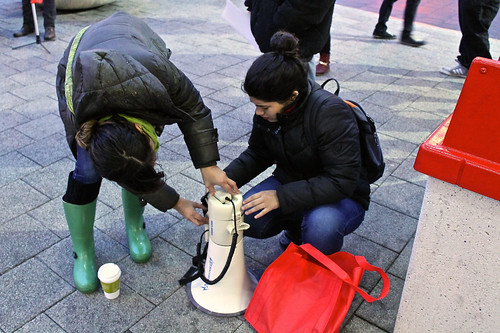
It was May 15, 2014, the day of a global strike and protest against the McDonalds Corporation for its selectively applied exploitative labor policies. In countries with strong unions and a high level of working class solidarity, a job at McDonalds means reasonably decent wages and benefits. But not everywhere. And definitely not here in the USA.
WOCC members are acutely aware of this which is why they say “Fight for $15 AND a union.” Victories won can be taken back again without strong worker organization and constant vigilance.
Soon, a sizable number of people were gathering within the small plaza in front of the Rock and Roll McDonalds. Located in the trendy Near North tourist area close to the Hard Rock Cafe, it is an unusually large and architecturally unique McDonalds.
Although named after a music born of youthful rebellion, it is run as a tight fisted dictatorship. One Rock and Roll McDonald’s worker said they treat the employees there like “animals.”
At first McDonalds security feigned friendliness and told people they could stay in the small plaza as long as they did not carry signs. Those could only be carried on the public sidewalk in front of the store.
But when a smiling mariachi band tried to play for the growing crowd carrying nothing but their instruments, McDonald’s security pushed them and everyone else on to the now crowded public sidewalk. Fortunately the overhang over the plaza extended to that narrow public space, giving the strikers, their allies and the media partial protection from a now wind-blown cold heavy rain. Spirits remained high as workers sang and chanted.
Forcing the media to cover themselves and their equipment against the elements was probably not the best way for McDonalds Corporation to get sympathetic coverage. Neither was the disingenuous official statement from their Oak Brook Illinois HQ:
“…The events taking place are not strikes. Outside groups have traveled to McDonald’s and other outlets to stage rallies.”
Calling their own striking workers part of an “outside group” was both disrespectful and untruthful. But the bad weather and the now unsmiling McDonalds security did not deter McDonald’s workers like Adriana Alvarez from speaking out at the early morning press conference:
“We’re here to show to show McDonald’s and everyone else that we are not going to put up with it anymore. This is global. Not just in the United States. Not just in Chicago. Everywhere. 100+ cities and 30 countries. We’re ready. I’m here because I have a 2 year old son. I want to give the world to my son but I can’t on today’s minimum wage so I need a living wage of $15 an hour.”
Chicago: A tale of two global cities
“I am proud to see A.T. Kearney has recognized the City of Chicago has a top global city of today and tomorrow….With our access to international transportation, central location between the coasts and pool of skilled workforce talent, businesses across the world realize all of the extensive opportunities Chicago has to offer as the city continues to shape the direction of the world in the coming years.” —Mayor Rahm Emanuel
Chicago is often called a global city and as Mayor Rahm Emanuel is fond of saying, a “world class” one at that. Rahm’s vision of Chicago as a global city is a greatly enhanced version of a downtown that already exists—- only with more glittering office towers and luxury condos. Where even more expensive cars cruise streets bordered by ornamental shrubs and colorful flowers. Where still more smartly dressed affluent mostly white people peruse the fancy shops lining the Magnificent Mile and its side streets. Where armies of business leaders and well-heeled tourists from across the planet will come to marvel at this Emerald City on the Lake.
You can read about this vision in A Plan for Economic Growth and Jobs a report commissioned by Mayor Emanuel himself. Buried deep within its 58 pages is this astonishingly frank statement:
”While the Plan for Economic Growth and Jobs will contribute to increased opportunity for individuals and more investment for communities, it is not a plan for poverty elimination and community development.”
No kidding, Mr Mayor. Eliminating poverty is not on your agenda. Neither is fair-minded community development. But what else could we expect from a “leader” whose actual constituency consists of high rolling hedge fund gamblers, gentrifying real estate speculators, shady mortgage lenders and predatory multinational corporations like McDonalds who ply their money-making trades with a coldblooded intensity that even Ebenezer Scrooge couldn’t match. Poverty wages are just too damned profitable. The skyrocketing wealth inequality which the McDonalds Corporation and the rest of the Chicago elite favors is dependent upon the continued existence of poverty.
The MacDonalds workers who went on strike May 15 have a different vision for the global city that Chicago could become, one that is widely shared by other low wage workers. While aimed specifically at McDonalds, the strike also send a message to other large corporations as well as government. It’s time for poverty wages to be raised to a living wage
The demand for a living wage is literally a fight for life. Poverty can kill, sometimes swiftly with a hail of bullets in the shadows of lonely street; sometimes slowly as stress and constant worry wears down an immune system, inviting multiple health problems that overwhelm the body and the city’s inadequate public health system.
Are you listening Ronald McDonald?
Chicago’s chronic and terrifying street violence is largely confined to the city’s most impoverished neighborhoods where unemployment, low wages and racism combine into a perfect storm of social distress. Raise wages. Cut the violence.
Are you listening Ronald McDonald?
Poverty can wound the mind as well, which is why the Chicago Teachers Union teamed with WOCC to help produce a report called “Fight for the Future: How low wages are failing children in Chicago’s schools”. From the report:
“Students living in or experiencing childhood poverty are much more likely to face significant unaddressed obstacles to classroom learning than their middle- and upper-income counterparts, and this impacts educational outcomes. In fact, data shows that family income is now the most significant predictor of academic success among students in the U.S.”
Are you listening, Ronald McDonald?
A living wage and the ability to organize a union without fear, as well fair minded investment in distressed communities would go along ways toward eliminating the poverty that is the root cause of so many human tragedies in Chicago.
Referring to a recent partial victory for the $15 an hour minimum wage in Seattle, Jamie, a McDonalds worker from Rockford said:”
We’re coming together with our coworkers, and we’re fighting for the right to join a union and $15 an hour…If they can get it in Seattle, we can get it in Chicago.”
The workers of Fight for $15 want not only better wages and benefits, but work schedules which are arrived at through honest negotiation, schedules that would enable them to have more time with their families; more time for relaxation; more time for personal goals and interests; more time to improve their neighborhoods; more time to live a rich and fulfilling live.
They want a global city of safe neighborhoods, good schools, clean well maintained parks, decent housing, affordable health care, access to nutritious food and all of the social amenities that come with a living wage enforced by a union contract.
They know such things are possible because they see people in more affluent communities having them at their fingertips.
Their vision of a global city comes with a global working class consciousness, an understanding of the power that working class people have if they unite across racial, regional and national boundaries.
You could see the fierce pride in the eyes of McDonalds worker Jessica Davis as she said:
”Just months ago we were just a few workers in a couple of cities. They thought we were crazy. Now we’re global. We’re 100+ cities and 30 countries. We are showing McDonalds that we are a force and they can’t ignore us any more”
This is not the globalization that Rahm and his wealthy friends have in mind.
Fight for $15: This is what solidarity looks like!
All day long individuals and groups came to show their support. With rain still falling in the morning, Action Now! a community organization with branches on the West and South Sides came clad in their characteristic blue t-shirts. They brought an enormous blue fist, their bullhorns and their chants as they joined Fight for $15 and marched around the block where Rock and Roll McDonalds is located.
There were people from the United Auto Workers, Chicago Teachers Union, United Food and Commercial Workers, International Association of Machinists, Service Employees International Union, Chicago Coalition for the Homeless, Jane Addams Senior Caucus, Brighton Park Neighbors and Albany Park Neighbors.
Representing one of the most ethnically diverse neighborhoods in the city, the Albany Park contingent proudly marched up Clark Street with the flags of nations that were participating in the global strike action. The flags also represented the many nationalities who live in that North Side neighborhood.
There were the usual friendly waves from passerby, the raised fists and the horn honking. Tourists snapped pictures from their tour buses and from the sidewalk. I decided to take a break around midday from note taking and photography and held up a Fight for $15 sign on the corner. A pair of tourists asked to borrow my sign so one could hold it up while the other snapped a picture for their Facebook friends.
By the time the protest ended at 6 PM, several hundred people had participated. It was a long day, but spirits were even higher when the rally closed and the group briefly occupied the Rock and Roll McDonalds plaza in a final act of defiance.
No one underestimates the difficulties that lie ahead within the corrupted political economy of Chicago, where the vast fortunes controlled by global corporations compete with the cry of the people demanding a better life.
Chicago needs more working class people in union meetings, in the streets, and on the picket lines. We also need more volunteers in insurgent electoral campaigns. Independent-minded elected leaders such as Kshama Sawant in Seattle, Washington and Marc Elrich in Montgomery County, Maryland have been instrumental in the fight toward gaining a living wage.
We need to exercise both economic and political power.
Jorge Mujica, an independent socialist candidate for city council who was on the picket line with the McDonalds strikers throughout the day, sums it up pretty well:
“We live in a working class city. It is our labor, our skills, our ingenuity, and our pride that built this city and that keep it running every day. Yet most of us are overworked and underpaid. We face a real crisis–not one of resources or possibilities, but of priorities. Until we create our own political voice, working people will remain locked out of political power.”
Whose global city? Our global city!
Bob “Bobbosphere ” Simpson is retired teacher and a member of Action Now!
Sources Consulted
Rahm Emanuel’s Chicago, a tale of two cities by Kevin Coval
Fast-food workers put their issues on the table by Elizabeth Schulte
Chicago’s world-class city complex by Jake Malooley
A Plan for Economic Growth and Jobs by the World Business Chicago (Chaired by Mayor Rahm Emanuel
Chicago Named Top Global City in A.T. Kearney Index by the World Business Chicago (Chaired by Mayor Rahm Emanuel
Fired Chicago sandwich workers continue the struggle: Fight for $15!
Filed under: Society and Economy, Unions
“When Snarf’s workers are under attack, what do we do? Stand up fight back!”
“When the working class is under attack? What do we do? Stand up fight back”
The chants rang out at noon on January 8 2014 in the ten degree temperatures left behind by the retreating Polar Vortex. But the bitter cold did not deter fired Chicago Snarf’s workers and their allies in the Workers Organizing Committee of Chicago (WOCC) from holding a lively picketline and press conference.
The 14 workers from a River North Chicago Snarfs had all been summarily terminated just 2 days before Christmas in a widely publicized mass firing. The excuse was that the store was to be “remodeled”.
Faced by a storm of bad media publicity, the Colorado-based Snarf’s CEO issued a Christmas Day Facebook apology. He promised that the workers would all receive a week’s severance pay. As of this writing there has been no sign of either the “remodeling” or the promised week’s severance pay. As Snarf’s worker Kevin Brown wryly pointed out,”If you get fired by e-mail, you apparently get apologized to by Facebook.”
The Chicago Neighborhood Schools Fair: Colorful balloons & brave resistance
Filed under: Education, Society and Economy, Unions
“I’m proud that this Neighborhood Schools Fair came from neighborhood parents— from neighborhood moms. And that they invited people from all over the city to be involved.”— Kim Bowsky, Chicago Public Schools teacher
You might not associate colorful balloons and a room full of school displays with a bold act of resistance, but that is what happened at Roberto Clemente High School on a gray drizzly November day in Chicago. It was the Neighborhood Schools Fair, a testament to the love that Chicago has for its neighborhood schools and their critical importance to the city.
It’s been a tough year for the education justice movement in Chicago. A lot of heartbreaks. A lot of tears. Fifty schools closed. Massive layoffs of teachers and other education workers. Sit-ins and multiple arrests. Parents frantic about their children’s’ safety going to school. Deep emotional ties among favorite teachers and their students broken. A steady stream of insults and lies coming from City Hall and the Chicago Public Schools(CPS) top brass.
The movement really needed affirmation. Something positive and joyful. Thankfully a small circle of activist women who call themselves “The Badass Moms”, or BAM, got together and hatched the idea of a one day exposition where neighborhood schools could set up displays, hold workshops and talk about their successes and their challenges.

Rousemary Vega, one of the BAM’s, told me that the goal was to create a web of relationships among neighborhood schools to build for a better educational future. This web would cross traditional racial and neighborhood lines in one of the most segregated cities in the USA, where neighborhood insularity and distrust of “outsiders” is the stuff of legend. Read more


